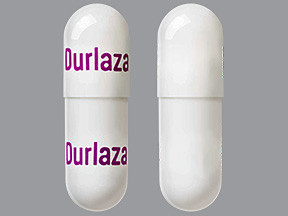ASPIRIN EXTENDED-RELEASE CAPSULE - ORAL
PHONETIC PRONUNCIATION: (AS-pir-in)
COMMON BRAND NAME(S): Durlaza
GENERIC NAME(S): aspirin
Uses
USES: This medication is a low dose of aspirin used to reduce the risk of having a heart attack in people who have heart disease. It is also used to reduce the risk of stroke in people who have previously had a stroke or "mini-stroke" (transient ischemic attack). Aspirin is known as a salicylate and a nonsteroidal anti-inflammatory drug (NSAID). This medication works by stopping platelets from clumping together and forming blood clots that can cause a heart attack or stroke. This medication is a long-acting form of aspirin and does not work right away. Other forms of aspirin (immediate-release) should be used when a fast effect is needed, such as right after a heart attack or for pain relief.
How to use ASPIRIN EXTENDED-RELEASE CAPSULE - ORAL
HOW TO USE: Take this medication by mouth as directed by your doctor, usually once a day. Swallow the capsule whole. Do not cut, crush, or chew the capsules. Doing so can release all of the drug at once, increasing the risk of side effects. If stomach upset occurs while taking this medication, take it with food or milk. Take this medication by mouth with a full glass of water (8 ounces/240 milliliters) unless your doctor directs you otherwise. Do not lie down for at least 10 minutes after taking this medication. Do not take this medication 2 hours before or 1 hour after drinking alcoholic beverages. NSAIDs (such as ibuprofen, naproxen) may decrease aspirin's ability to prevent heart attack/stroke. If you use a NSAID, take it at least 8 hours before or at least 2 to 4 hours after this medication (see also Drug Interactions section). Take this medication regularly to get the most benefit from it. To help you remember, take it at the same time each day.
Side Effects
Precautions
Interactions
Overdose
Images

- color
- white
- shape
- oblong
- imprint
- Durlaza, Durlaza
Reviews
Faq for ASPIRIN EXTENDED-RELEASE CAPSULE - ORAL
- Aspirin extended-release capsule is used to relieve pain, reduce fever, and decrease inflammation. It is commonly used to treat conditions such as arthritis, headache, toothache, and menstrual pain.
- Aspirin extended-release capsule belongs to a class of medications called nonsteroidal anti-inflammatory drugs (NSAIDs). It works by blocking the production of certain chemical substances in the body that contribute to pain, fever, and inflammation.
- The recommended dosage of aspirin extended-release capsule varies depending on the medical condition being treated. It is important to follow the instructions provided by your doctor or pharmacist. Do not exceed the recommended dosage without medical supervision.
- Yes, aspirin extended-release capsule can cause side effects. Common side effects include stomach upset, heartburn, nausea, vomiting, and drowsiness. Serious side effects such as allergic reactions, bleeding, and liver damage are less common but require immediate medical attention.
- It is essential to inform your doctor or pharmacist about all the medications you are currently taking, including prescription, over-the-counter, and herbal products. Some medications may interact with aspirin and increase the risk of side effects or affect its effectiveness.
- Aspirin should not be given to children without medical supervision. In children, aspirin can increase the risk of a rare but serious condition called Reye's syndrome. It is important to consult a healthcare professional for appropriate pain relief options for children.
- It is generally recommended to avoid alcohol consumption while taking aspirin extended-release capsule. Alcohol can increase the risk of stomach bleeding and may also reduce the effectiveness of the medication.
- If you miss a dose, take it as soon as you remember. However, if it is close to the time for your next scheduled dose, skip the missed dose and continue with your regular dosing schedule. Do not take a double dose to make up for a missed one.
- Aspirin extended-release capsule should be stored at room temperature, away from moisture, heat, and light. Keep it out of reach of children and pets. Do not store medication in the bathroom. Always check the expiration date and properly dispose of any expired medication.
Disclaimer
IMPORTANT: HOW TO USE THIS INFORMATION: This is a summary and does NOT have all possible information about this product. This information does not assure that this product is safe, effective, or appropriate for you. This information is not individual medical advice and does not substitute for the advice of your health care professional. Always ask your health care professional for complete information about this product and your specific health needs.
No Reviews Yet